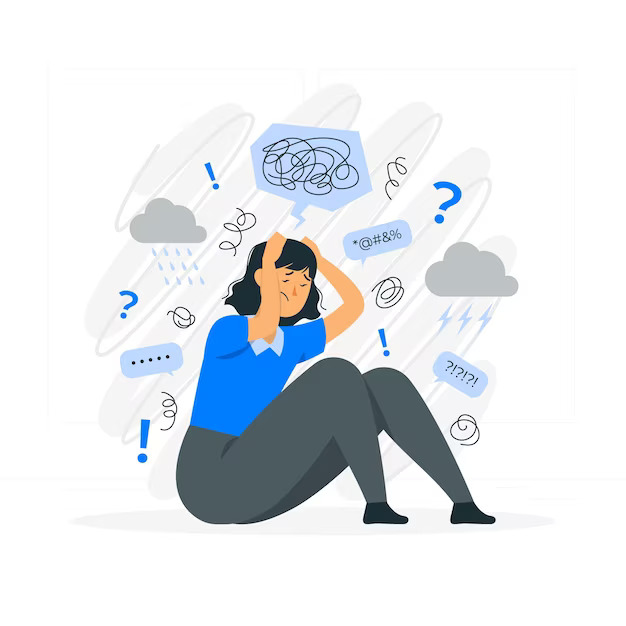Anxiety therapy is a form of treatment aimed at helping individuals cope with and manage their anxiety symptoms. Through various therapeutic techniques and interventions, such as cognitive-behavioral therapy (CBT), mindfulness practices, and relaxation techniques, anxiety therapy assists individuals in understanding the root causes of their anxiety and developing effective strategies to alleviate symptoms. The goal of anxiety therapy is to empower individuals to regain control over their thoughts, emotions, and behaviors, allowing them to lead more fulfilling and balanced lives.
Is Anxiety Therapy Right for You?
Determining if anxiety therapy is right for you depends on various factors. If you’re experiencing symptoms of anxiety that interfere with your daily life, such as excessive worry, fear, or avoidance behaviors, therapy could be beneficial. Additionally, if you’re open to exploring your thoughts and feelings in a supportive environment and committed to making positive changes, anxiety therapy may be a good fit. Consulting with a qualified therapist can help you assess your specific needs and determine if therapy is the right option for managing your anxiety effectively.
Why Is Anxiety Therapy Important?
Embark on your journey to healing through anxiety therapy with the support of a “Counseling psychologist”.
- Understanding: Therapy helps individuals understand the root causes and triggers of their anxiety.
- Validation: It provides validation for the individual’s experiences and feelings, reducing feelings of isolation.
- Learning Coping Skills: Therapy equips individuals with coping skills to manage anxiety symptoms effectively.
- Identifying Patterns: Individuals can identify patterns of thought and behavior contributing to their anxiety.
- Challenging Negative Thoughts: Therapy helps challenge and reframe negative thought patterns that fuel anxiety.
- Developing Resilience: It fosters resilience and strengthens individuals’ ability to cope with stressors.
- Improving Self-Esteem: Therapy can improve self-esteem and self-confidence, reducing anxiety levels.
- Enhancing Communication: Individuals learn effective communication skills to express their needs and boundaries.
- Building Healthy Relationships: Therapy assists in building healthier relationships and setting boundaries.
- Reducing Avoidance Behaviors: Individuals can confront and gradually overcome avoidance behaviors that maintain anxiety.
- Preventing Escalation: Early intervention through therapy can prevent anxiety from escalating into more severe mental health conditions.
- Promoting Self-Care: Therapy encourages individuals to prioritize self-care and engage in activities that promote well-being.
- Providing Support: It offers a supportive environment where individuals feel heard, understood, and accepted.
- Addressing Underlying Issues: Therapy addresses underlying issues such as trauma or past experiences contributing to anxiety.
- Developing Personal Power:– It gives people the ability to take charge of their life and make constructive adjustments.
- Improving Overall Quality of Life: Ultimately, anxiety therapy helps individuals lead more fulfilling and balanced lives by reducing the impact of anxiety on their daily functioning.
Find relief and improve your well-being with anxiety therapy, where “Therapist near me” offer support and effective strategies.
How to Find the Right Anxiety Therapy for You?
Certainly, here are to consider when finding the right anxiety therapy for you:
- Assess Your Needs: Reflect on your specific symptoms, triggers, and goals for therapy.
- Research Different Therapies: Learn about different types of therapy commonly used to treat anxiety, such as cognitive-behavioral therapy (CBT), mindfulness-based therapy, or exposure therapy.
- Seek Professional Guidance: Consult with a mental health professional, such as a therapist or psychologist, to discuss your options and receive personalized recommendations.
- Check Qualifications: Ensure that the therapist you choose is licensed and experienced in treating anxiety disorders.
- Consider Therapy Formats: Explore different therapy formats, including individual therapy, group therapy, or online therapy, and choose the one that best suits your preferences and needs.
- Evaluate Accessibility: Consider the location, availability, and cost of therapy sessions to ensure they are accessible and convenient for you.
- Assess Therapist Compatibility: Evaluate the therapist’s approach, communication style, and personality to ensure a good fit.
- Ask About Specializations: Inquire whether the therapist specializes in treating anxiety disorders or has experience working with clients with similar concerns.
- Inquire About Techniques: Ask about the therapeutic techniques and interventions the therapist uses to address anxiety and whether they align with your preferences.
- Seek Recommendations: Seek recommendations from trusted sources, such as friends, family, or healthcare providers, who may have experience with anxiety therapy.
- Consider Feedback: Read reviews or testimonials from previous clients to gauge the therapist’s effectiveness and client satisfaction.
- Trust Your Instincts: Trust your instincts and choose a therapist with whom you feel comfortable and supported.
- Discuss Treatment Plan: Have a discussion with the therapist about your treatment plan, including goals, frequency of sessions, and expected duration of therapy.
- Be Open-Minded: Be open-minded and willing to try different approaches or techniques suggested by the therapist.
- Monitor Progress: Regularly assess your progress in therapy and communicate any concerns or adjustments needed with your therapist.
- Adjust as Needed: Be willing to adjust or change therapists if you feel that your current therapy approach is not meeting your needs or goals.
Conclusion
By considering these points, you can find the right anxiety therapy that aligns with your preferences, needs, and goals, ultimately leading to more effective treatment outcomes.

